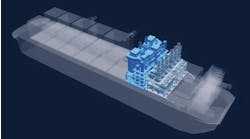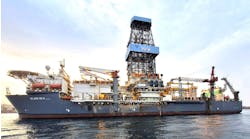Many offshore companies will go to industry organizations to consider drawing up recommended training standards, according to commentary at a recent workshop sponsored by the US Minerals Management Service (MMS). The MMS has proposed new performance-based regulation for training workers. Industry organizations can assist companies worldwide in drawing up plans, saving time and money.
Under the proposed rule, the burden of deciding how often and for how long to train offshore oil and gas workers will rest on the operators and contractors, rather than regulatory agencies. Under existing procedures, the MMS has rigid lists of training requirements that must be met for each worker, and accredits schools to teach the required courses.
Under the new rule, companies will have the flexibility to decide how often each worker will have to undergo a particular type of training, from whom the training is acquired, and how it is administered (team-based, on-the-job, or computer-based). Schools will no longer be accredited, though companies may use them for their plans. The MMS will occasionally check up on companies or their facilities using announced or unannounced inspections at which the agency may view the training plan and determine the training level of workers using interviews, written tests, or hands-on production safety tests. All testing must be paid for by lessees.
Comments on the proposed rule are due by July 19, and it is planned for a final rule to be issued by the end of the year. A transition period will continue through the first quarter 2000, and the rule will be effective at the beginning of the second quarter.
Apache buys properties from Shell for $715 million
Shell Exploration & Production agreed to sell 22 producing fields and 16 exploration leases in the Gulf of Mexico to Apache for $715 million in cash plus one million shares of Apache stock. Apache will also have access to 3D seismic data covering more than 1,000 blocks throughout the US Gulf.
Proved reserves on the properties, all of which are located in water depths of less than 700 ft, are estimated at 127.3 MMboe. In February, the properties recorded average net production of 24,900 b/d of oil and 125 MMcf/d of gas. The agreement will be effective retroactively, beginning March 1.
In another transaction, Apache agreed in principle to sell more than $100 million in North American properties, mostly onshore, to Shell. If the transaction is approved, Apache will continue to operate the properties in exchange for a management fee, and could eventually earn back interest in the properties.
GM's Rose: jackup rates have bottomed out
Global Marine said the April worldwide summary of current offshore rig economics, or SCORE, for all types of offshore drilling rigs worldwide fell 25.3% since March, extending its fall to a full year. Global Marine's President and CEO Bob Rose said, "The offshore drilling industry continues to suffer from last year's low oil and US natural gas prices. Recent contract day rates for jackup rigs drilling on the continental shelf in the US Gulf of Mexico are now generally at or below cash operating cost and therefore unlikely to go any lower.
"While there is further downside potential for day rates in other regions and in deepwater, both oil and natural gas prices have recently risen to levels that should stimulate an eventual recovery in drilling. Assuming oil and gas prices hold at current levels, we expect that our markets will bottom out and begin to improve within the next few months."
Burlington buys Pluto interest
Burlington Resources acquired a 63% working interest in the Pluto project from Mariner Energy. As part of the agreement, Burlington reimbursed Mariner for a proportionate share of Pluto's costs through April 30 and agreed to pay a proportionate share of the remaining costs of the development. Pluto is located on Mississippi Canyon 673, 674, 717, and 718 in 2,800 ft of water. Mariner Energy is the operator of the project and holds the remaining interest. Development as planned will be by a production well and a subsea completion tied back to a host platform on South Pass 89. Development will begin in July, and first production is set for the fourth quarter. When all costs are recovered, Burlington's interest will be 49%.
Costs cut on Unocal deepwater well
Unocal Spirit Energy 76 said it drilled a Gulf of Mexico deepwater well in record time and cut costs by 50%. Transocean's rig, the George Richardson, spudded a well on South Sierra prospect on Garden Banks 551 in 3,674 ft of water. The drilling rate was 479 ft per day, compared with 206 ft per day for a comparable deepwater exploration well in the Garden Banks area. The well reached a TD of 14,360 ft in 30 days, finding non-commercial hydro carbons in two intervals. Unocal's 50% share of the costs of the well was $7.6 million. South Sierra was the first well in a six-month drilling program for the George Richardson. The rig has now moved on to the Bowshock prospect on Garden Banks 460, where Unocal holds 100% working interest.
ARO to sell off 80% of US Gulf assets
American Resources announced it would dispose of 80% of its Gulf of Mexico assets as part of an agreement - outlined in a letter of intent - wherein Blue Dolphin will acquire 75% of American Resources Offshore. ARO's Gulf of Mexico assets are an average of 29% of non-operated working interest in 49 offshore federal lease blocks in the central and western US Gulf of Mexico.
Proven reserves of the properties are 36 bcf with significant probable and possible reserves. The total purchase price for the ARO stock and assets is $33.75 million, including $5.3 million in cash. The companies are negotiating a definitive agreement. Although it is subject to shareholder and board agreement, closing is expected during the third quarter. The effective date of the transaction will be Jan. 1.


